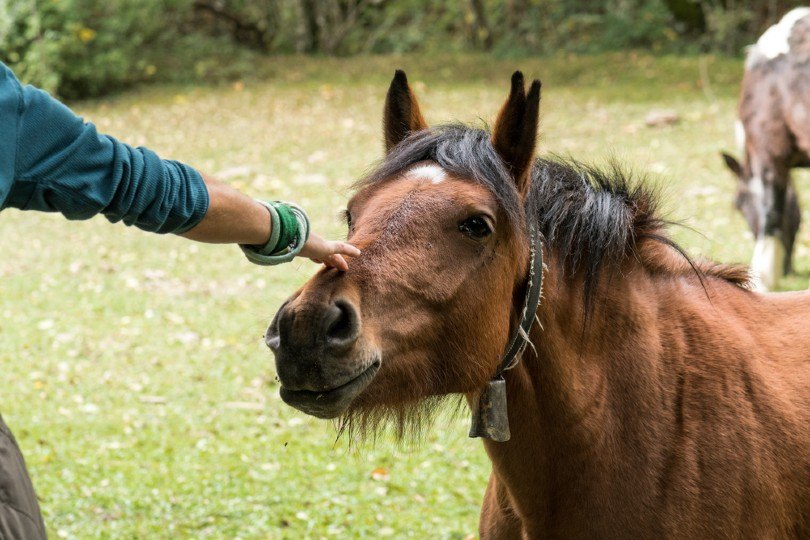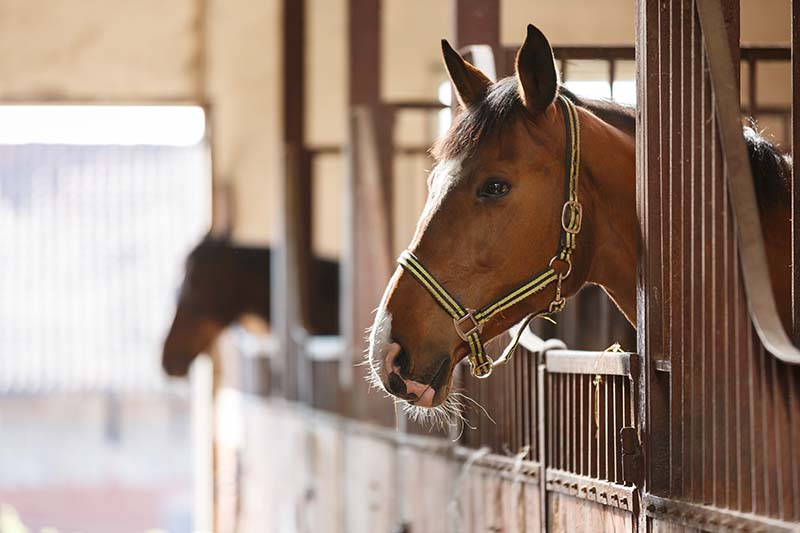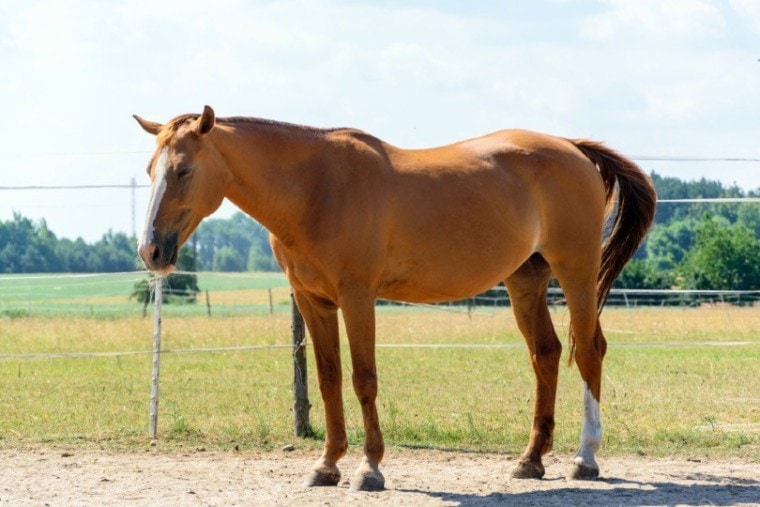
Many people are obsessed with their own weight, but they often forget that the weight of their pet is just as important. Though no animal benefits from having an unhealthy weight, horses especially need to be of a healthy size. This makes it important to know how much your horse should and does weigh.
Horses typically weigh between 900 and 2,000 pounds, but the average weight for your horse will depend on its breed, age, and several other factors. To find out more about the average horse weight, as well as how to weigh your horse, keep reading.

How Much Does a Horse Weigh?
Because there are a variety of horse breeds and shapes, the average weight has a large range. The average-sized horse will weigh anywhere between 900–2,000 pounds. As you would assume, bigger horse breeds are going to weigh more than smaller horse breeds.
For example, large horse breeds will most likely weigh between 1,700–2,000 pounds. Large horse breeds include draft horses like Belgians or Percherons. Conversely, light horses, like Arabians, typically weigh 900–1,500 pounds. Ponies will weigh even less.
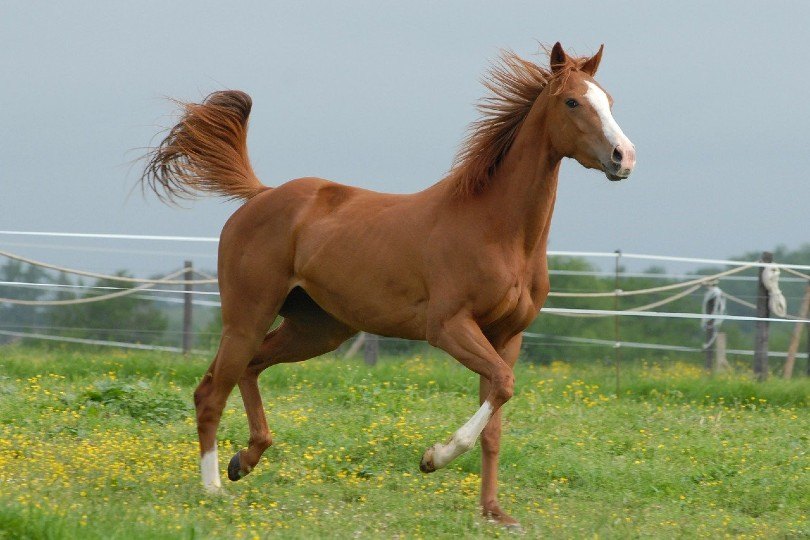
What Factors Impact a Horse’s Weight?
Factors that lead to a horse’s weight are similar to the factors that impact a human’s weight. How much food the horse eats will largely contribute to their body weight and body fat. Most horses need to eat between 1.5% and 3% of their body weight each day.
In addition, horses need a whole lot of exercise. They have evolved so that they can stand or move nearly the entire day. If your horse does not exercise enough but still eats the recommended percentage, it will quickly become overweight, leading to health and joint problems.
One surprising factor that affects a horse’s weight is its oral health. If your horse quickly loses weight, its teeth may be to blame. When a horse has a sharp or bad tooth, they are likely not to eat. Check the dental health of your horse if you notice their eating habits changing.
Additionally, the season can impact your horse’s weight. Like many other animals, horses tend to lose a little bit of weight in the winter and gain it back in the summer. That’s because horses eat more in the summer because resources are more available. Whenever forage decreases in the winter, they eat less, and their caloric needs increase, leading to less weight.
Horse Breed Weight Chart
| Horse Breed | Average Weight (pounds) | Average Weight (kg) |
| American Warmblood | 1,212–1,322 pounds | 550-600 kg |
| Arabian | 793–992 pounds | 350-450 kg |
| Ardennes | 1,543–2,205 pounds | 700-1000 kg |
| Cleveland Bay | 1,212–1,543 pounds | 550-700 kg |
| Clydesdale | 1,543–1,764 pounds | 700-800 kg |
| Connemara Pony | 639–860 pounds | 290-390 kg |
| Dales Pony | 882–1,102 pounds | 400-500 kg |
| Dartmoor Pony | 441–705 pounds | 200-320 kg |
| Dutch Warmblood | 1,212–1,322 pounds | 550-600 kg |
| Eriskay Pony | 661–882 pounds | 300-400 kg |
| Exmoor Pony | 661–882 pounds | 300-400 kg |
| Fell Pony | 772–992 pounds | 350-450 kg |
| Hackney | 882–1,212 pounds | 400-550 kg |
| Hackney Pony | 551–772 pounds | 250-350 kg |
| Haflinger | 772–1,322 pounds | 350-600 kg |
| Hanoverian | 1,212–1,433 pounds | 550-650 kg |
| Highland Pony | 1,102–1,322 pounds | 500-600 kg |
| Holsteiner | 992–1,764 pounds | 450-800 kg |
| Irish Draught | 1,322–1,764 pounds | 600-800 kg |
| New Forest Pony | 507–728 pounds | 230-30 kg |
| Percheron | 1,874–2,094 pounds | 850-950 kg kg |
| Shetland Pony | 397–441 pounds | 180-200 kg |
| Shire | 1,543–2,646 pounds | 700-1200 kg |
| Spotted Pony | 441–882 pounds | 200-400 kg |
| Suffolk Punch | 1,653–1,984 pounds | 750-900 kg |
| Swedish Warmblood | 882–1,212 pounds | 400-550 kg |
| Thoroughbred | 992–1,102 pounds | 450-500 kg |
| Welara | 661–882 pounds | 300-400 kg |
| Westphalian | 992–1,322 pounds | 550-600 kg |

How Can I Find Out How Much My Horse Weighs?
If you are concerned about your horse’s weight, you need to find out exactly how much they weigh. Just as with humans, the most accurate way to determine your horse’s weight is to use an equestrian scale. If you know a veterinarian with an equestrian scale, give them a call to see if you can use the scale to weigh your horse.
Unfortunately, these scale types are not available to everyone. If you are one of these people, there are other ways that you can estimate your horse’s weight. These techniques won’t be as accurate as a scale, but they will be close enough to gauge if your horse is of a healthy weight.
1. Weighbridge
A weighbridge is a giant set of scales that is mainly used for weighing large transports like tractor-trailers and train cars. Taking your horse on one of these scales is the easiest and most accurate way to figure out its weight, though not everyone will be able to get access to a weighbridge.
2. Weight Tape
Weight tape is a special measuring tape that has units listed in pounds, not inches or feet. For this method, you will need to wrap the weight tape around your horse at its heart girth. This will give you a rough estimate of your horse’s weight.
The main downside of this option is that weight tapes are primarily only useful for horses that have a typical body type for their breed. If your horse is notably smaller or larger than other horses within their breed, the findings may not be as accurate.
3. Weight Calculations
Another way to estimate your horse’s weight is to do weight calculations on your own. You will need a calculator and measuring tape for this technique. If you are not very good at math, don’t worry. This technique is really simple to do.
To measure a mature horse, simply measure their heart girth and body length. The heart girth will be measured at the base of the mane and down below the rib cage. As for the body length, place the measuring tape between the hind thigh and center of the chest.
Then, insert those numbers into the following formula: (heart girth x heart girth x body length) / 330. The result will be your horse’s weight in pounds.
For calculation purposes, this formula is based on inches and is only suitable for adult horses. For yearling horses, substitute 330 with 301. Similarly, substitute 330 with 280 for weanlings and 299 for ponies.

Why Do I Need to Know How Much My Horse Weighs?
It is important to know your horse’s weight for a couple of reasons. Most importantly, it can tell you if your horse is of a healthy weight. It is imperative that horses do not get overweight or underweight. Both could lead to serious issues in a short matter of time.
Even for horses of a healthy weight, tracking their weight tells you how much you should be feeding them. Once again, horses need to eat 1.5% to 3% of their body weight a day. You can’t give them the correct amount of food if you don’t know how much they weigh.
More so, it’s important to know how much your horse weighs if you want to ride it. Horses can carry about 15% to 20% of their body weight. For example, a 1,000-pound horse should only carry a rider that is 200 pounds or less. Knowing the horse’s weight ensures you don’t put too much on its back.


Body Condition Score
The best way to determine if your horse is of a healthy weight is to use the body condition score (BCS). The BCS evaluates how much fat is located under your horse’s skin in six different areas. This includes under the neck, withers, behind the shoulder, back, rib, and tail head.
The BCS will use the Kenneke Scale, which ranges from 1 to 9. 1 means that the horse is underweight, whereas 9 means the horse is extremely overweight or obese. It is best for your horse to fall between the 4 to 6 range.
What to Do If Your Horse Has an Unhealthy Weight?
If you calculate your horse’s size and it appears to be of unhealthy weight, it is important to talk to your veterinarian about the issue. A veterinarian will be able to weigh the horse more accurately to ensure that all the calculations were done right.
For overweight horses, you will need to cut back on their food and exercise them more. It is important to combine these two techniques for optimal results. Your vet should give you additional tips and advice for helping your horse lose weight.
Horses can be underweight, too. If your horse is just slightly underweight, it may be because it is not getting enough calories. Make sure that they have 24/7 access to hay. You might also need to add grain to their diet. Change the feed gradually so as not to upset the horse’s stomach.
Other factors can impact an underweight horse as well. Age, climate, health, and environment can all lead to a horse losing weight. Talk to your veterinarian about any possible health issues leading to your horse’s underweight status.
How to Care for an Overweight Horse
If you determine that your horse is overweight, you’ll need to provide specific care to help manage its weight and get it back down to a healthy level. Here are some tips to help you along the way.
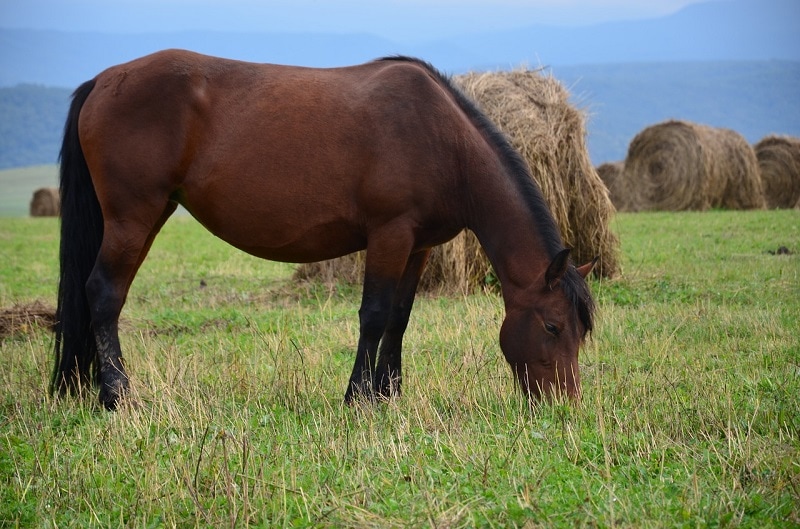
How to Care for an Underweight Horse
Overweight horses tend to be a bit more common than underweight horses, but if a horse is underweight, it could be susceptible to a litany of health concerns similar to an overweight horse. Luckily, it’s usually not too difficult to help an underweight horse gain a few pounds. If you find yourself caring for an underweight horse, try these steps:

Final Thoughts
Once again, the average horse weighs between 900 and 2,000 pounds. Knowing your horse’s weight can help pinpoint any health issues to ensure that your horse is living its best life possible. Pay most attention to the body condition score and talk to your veterinarian if you are concerned about your horse’s weight.
See also:
- How Long Can Horses Be Left Alone? (Vet Reviewed Facts)
- How Big Does a Horse Get? Vet-Reviewed Average Weight & Growth Chart
Featured Image Credit: Yurkovski, Shutterstock

